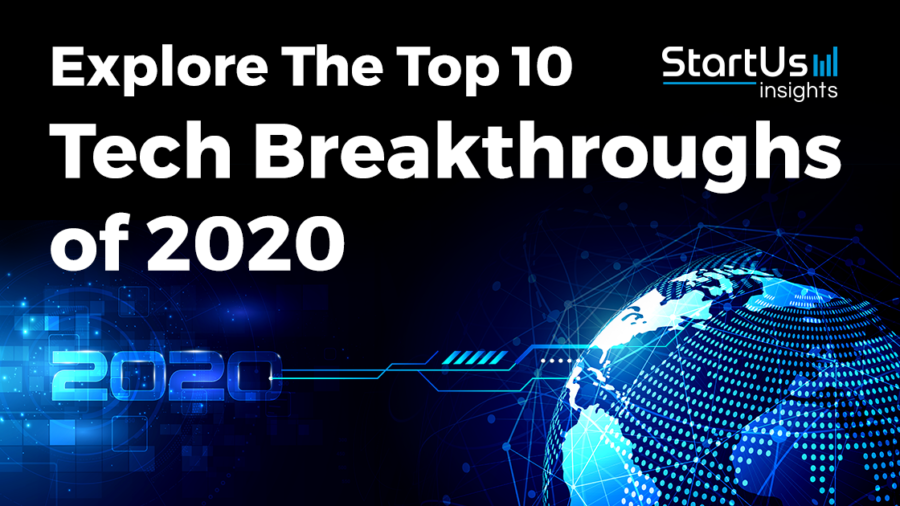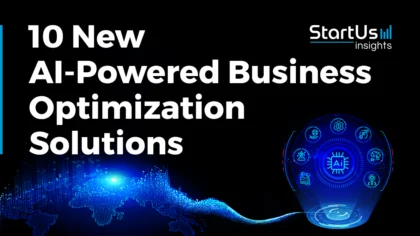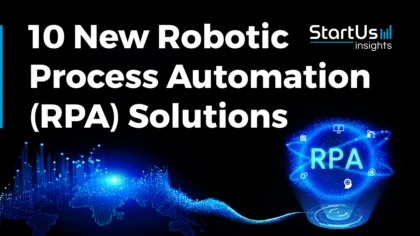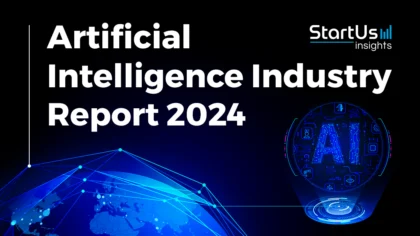The coronavirus pandemic, efforts to contain its spread, and various investigational treatments occupied much of the news this year. At first glance, it may seem that 2020 was all about doom and gloom. However, this couldn’t be farther from the truth. This data-driven report revisits 10 major tech breakthroughs of the year to provide you a list of reasons to be optimistic for the future.
The report helps you identify major growth opportunities across different industries – from telecommunication and space tech to computing, biotech, and more. Spotted using our StartUs Insights Discovery Platform, covering over 1.3 million startups & scaleups globally, you will also discover 10 companies taking each of these breakthroughs further.
10. Fast Development of Low-Carbon Cement Technologies
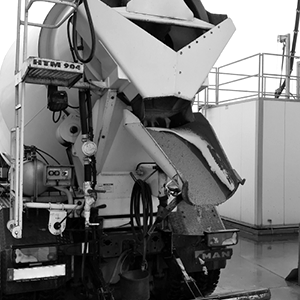 Only potable water surpasses cement in everyday use, as cement is used in practically everything people build. The production of cement, however, is one of the top CO2 polluters. In 2020, multiple innovations in new materials and technologies involved in cement production. Swiss building materials manufacturer LafargeHolcim announced its new CEM-II Portland cement product with significantly lower carbon emissions. Additionally, LafargeHolcim, together with US-based company Solidia Technologies, developed carbon capture and storage solutions that allow for a 70% reduction in carbon emissions.
Only potable water surpasses cement in everyday use, as cement is used in practically everything people build. The production of cement, however, is one of the top CO2 polluters. In 2020, multiple innovations in new materials and technologies involved in cement production. Swiss building materials manufacturer LafargeHolcim announced its new CEM-II Portland cement product with significantly lower carbon emissions. Additionally, LafargeHolcim, together with US-based company Solidia Technologies, developed carbon capture and storage solutions that allow for a 70% reduction in carbon emissions.
Alcemy – AI-Powered Carbon Reduction in Cement and Concrete
German startup Alcemy develops AI software that allows prediction and control over the properties of cement and concrete during production. The startup’s machine learning (ML) tools collect the materials production data to train the model regularly. The prediction models help determine the optimal production parameter values for achieving higher quality cement and concrete, reducing the carbon footprint during production.
9. Green Hydrogen Revolution
 Although common methods of hydrogen production such as coal gasification and steam methane reforming (SMR) are low-cost, they are environmentally inefficient. Hydrogen production through electrolysis using electricity from renewable energy is considered the cleanest form as it leaves no by-product, thereby releasing no CO2 emissions. 2020 saw major steps from governments and businesses towards the adoption of green hydrogen. Major European countries such as France and Germany announced multi-billion Euro packages to develop a clean hydrogen industry. China reported significant progress in green hydrogen cost reduction. South Korean automotive company Hyundai Motor shipped its first fuel-cell heavy-duty XCIENT Fuel Cell truck for commercial use. Additionally, French aerospace company Airbus revealed the concept for its first hydrogen-powered aircraft.
Although common methods of hydrogen production such as coal gasification and steam methane reforming (SMR) are low-cost, they are environmentally inefficient. Hydrogen production through electrolysis using electricity from renewable energy is considered the cleanest form as it leaves no by-product, thereby releasing no CO2 emissions. 2020 saw major steps from governments and businesses towards the adoption of green hydrogen. Major European countries such as France and Germany announced multi-billion Euro packages to develop a clean hydrogen industry. China reported significant progress in green hydrogen cost reduction. South Korean automotive company Hyundai Motor shipped its first fuel-cell heavy-duty XCIENT Fuel Cell truck for commercial use. Additionally, French aerospace company Airbus revealed the concept for its first hydrogen-powered aircraft.
Planetary Hydrogen – Ocean Air Capture (OAC)
Canadian startup Planetary Hydrogen develops green hydrogen production technology capable of capturing and storing CO2. The startup upgrades the electrolysis process by adding mineral salt, which produces mineral hydroxide as a by-product. This allows the startup to both produce clean hydrogen and consume CO2, making it’s OAC a negative emissions technology.
8. Artificial Intelligence (AI) Makes Significant Progress in Protein Folding
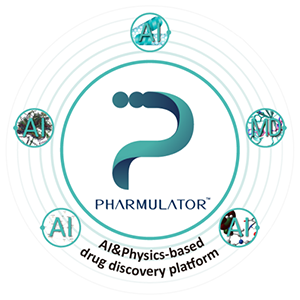 AlphaFold, developed by the Google-owned AI company DeepMind, correctly predicted protein structures with the highest accuracy in the latest Critical Assessment of protein Structure Prediction (CASP) challenge. DeepMind’s deep learning algorithms significantly outperformed other competitors, as well as its performance in 2018. The major advance in the 50-year-old protein folding challenge has the potential to accelerate the progress across multiple industries, helping better understand diseases and develop drugs. Research groups from various companies and startups take part in CASP challenges.
AlphaFold, developed by the Google-owned AI company DeepMind, correctly predicted protein structures with the highest accuracy in the latest Critical Assessment of protein Structure Prediction (CASP) challenge. DeepMind’s deep learning algorithms significantly outperformed other competitors, as well as its performance in 2018. The major advance in the 50-year-old protein folding challenge has the potential to accelerate the progress across multiple industries, helping better understand diseases and develop drugs. Research groups from various companies and startups take part in CASP challenges.
PharmCADD – In-Silico Drug Design
South Korean startup PharmCADD creates computational models for therapeutics development. The startup develops its own protein structure prediction platform, Pharmulator, which uses a simulation of molecular dynamics and quantum calculation for improved prediction. The platform is also capable of toxicity prediction and drug generation, comprising a multifunctional data-driven simulation tool.
7. First Commercial Crewed Launch to the International Space Station (ISS)
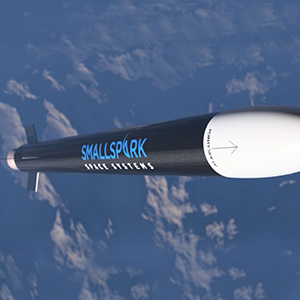 2020 was a momentous year for the commercial space industry. In May, US-based company SpaceX launched 2 NASA astronauts to the International Space Station in the first commercial orbital crew launch. In November, SpaceX’s Falcon 9 launched the company’s Crew Dragon Resilience spacecraft carrying the first full crew to the ISS. The success of SpaceX’s NASA missions also catalyzes its space tourism program, which is scheduled to begin in late 2021 in a deal that the company signed with US-based startup Axiom Space. Startups and scaleups play an important part in the development of space technology, working in such areas as onboard autonomy, in-situ utilization, as well as debris retrieval and monitoring.
2020 was a momentous year for the commercial space industry. In May, US-based company SpaceX launched 2 NASA astronauts to the International Space Station in the first commercial orbital crew launch. In November, SpaceX’s Falcon 9 launched the company’s Crew Dragon Resilience spacecraft carrying the first full crew to the ISS. The success of SpaceX’s NASA missions also catalyzes its space tourism program, which is scheduled to begin in late 2021 in a deal that the company signed with US-based startup Axiom Space. Startups and scaleups play an important part in the development of space technology, working in such areas as onboard autonomy, in-situ utilization, as well as debris retrieval and monitoring.
Smallspark Space Systems – Launch Vehicles
British startup Smallspark Space Systems develops low-cost and easy to transport launch vehicles. The startup’s Frost Micro launch vehicle is designed for suborbital research, while the Frost One system is developed for orbital launch. With its easy to produce and transport launch vehicles, Smallspark Space Systems enables rapid access to orbit from any launchpad.
6. Quantum Computing Heralds the Future of Computing
 2020 was a breakout year for the field of quantum computing. Tech giants including Google, Amazon, and Microsoft are investing heavily in quantum computing. IBM revealed a 65 qubit quantum computer and has set itself the goal to develop a 1000 qubit quantum computer by the end of 2023. D-Wave Systems upped the ante by releasing a 5000 qubit quantum computer. Initially limited to quantum encryption, startups are now exploring use cases for quantum computing in different industries. For instance, D-Wave’s new supercomputers have already been put to use in automotive, logistics, and pharma.
2020 was a breakout year for the field of quantum computing. Tech giants including Google, Amazon, and Microsoft are investing heavily in quantum computing. IBM revealed a 65 qubit quantum computer and has set itself the goal to develop a 1000 qubit quantum computer by the end of 2023. D-Wave Systems upped the ante by releasing a 5000 qubit quantum computer. Initially limited to quantum encryption, startups are now exploring use cases for quantum computing in different industries. For instance, D-Wave’s new supercomputers have already been put to use in automotive, logistics, and pharma.
Entropica Labs – Quantum Optimization
Entropica Labs is a Singaporean startup that focuses on quantum optimization and machine learning. The startup helps enterprises integrate quantum computing technologies. By designing its software to work with all leading quantum computing platforms, the startup ensures smooth integration, testing, and benchmarking across different workflows, models, and computing systems. By demonstrating the usefulness of quantum computing for multiple applications, the startup is accelerating the adoption of the technology.
5. The Pandemic Presents an Opportunity for Western Manufacturers
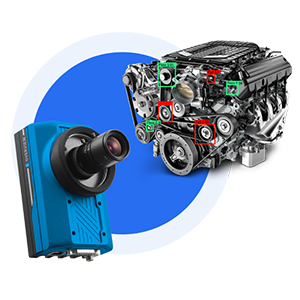 The coronavirus pandemic impacted demand and supply, as well as workforce availability, almost simultaneously across the world. Western economies realized the problem in depending largely on manufacturers in Asia, particularly China. This was felt quite acutely as many countries failed to match the production with the demand for personal protective equipment (PPE). Add to that the low availability of workers due to social distancing norms and economic downturn, manufacturers turned to automation to regain profits. As companies in North America and Europe seek to bring manufacturing back to their shores, automation solutions will be critical to staying competitive like the Asian markets.
The coronavirus pandemic impacted demand and supply, as well as workforce availability, almost simultaneously across the world. Western economies realized the problem in depending largely on manufacturers in Asia, particularly China. This was felt quite acutely as many countries failed to match the production with the demand for personal protective equipment (PPE). Add to that the low availability of workers due to social distancing norms and economic downturn, manufacturers turned to automation to regain profits. As companies in North America and Europe seek to bring manufacturing back to their shores, automation solutions will be critical to staying competitive like the Asian markets.
Overview – Automated Inspection
Overview is a US-based startup that offers solutions for automated inspection and streamlined quality control. The startup integrates image capture and AI into the manufacturing process, using images taken from an Overview camera, mobile devices, or existing camera systems. The startup’s platform uses deep learning algorithms to automate inspection for faster product ramp-ups. In addition to helping manufacturers build faster, Overview’s solution increases yield and reduces costs associated with wasted materials and returns.
4. Cloud-Native Technologies Vital for Remote Work
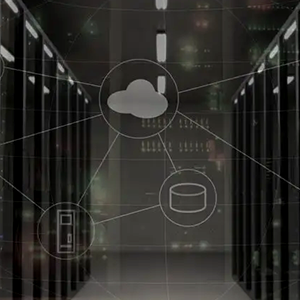 The pandemic forced companies around the world to ask their employees to work from home. As companies had to adopt solutions that enabled a smoother transition, many began to see the merits of remote work such as a boost in productivity. The scalability of cloud-native applications allowed services like Zoom and Microsoft Teams to rapidly adapt to the explosive growth in the number of users. For software-based companies, this presented a strong case for the adoption of cloud-native technologies. This is reflected by the increased demand for container software, hybrid cloud architectures, and edge computing.
The pandemic forced companies around the world to ask their employees to work from home. As companies had to adopt solutions that enabled a smoother transition, many began to see the merits of remote work such as a boost in productivity. The scalability of cloud-native applications allowed services like Zoom and Microsoft Teams to rapidly adapt to the explosive growth in the number of users. For software-based companies, this presented a strong case for the adoption of cloud-native technologies. This is reflected by the increased demand for container software, hybrid cloud architectures, and edge computing.
Nightfall – Data Loss Prevention (DLP)
Nightfall AI is a US-based startup that uses machine learning to identify critical business data. The startup’s eponymous platform protects data across a company’s entire software-as-a-service (SaaS) platform, application programming interfaces (APIs), and data infrastructure. This platform supports many popular tools, including Slack, Google Drive, Github, Jira, and Confluence. The platform prevents data exfiltration, protects credentials and business secrets, secures customer and employee data, and prevents insider threats.
3. Vaccine Platform Technologies Provide Flexibility and Speed
The UK has started vaccination against COVID-19 and other countries will soon be following suit. The development of a COVID-19 vaccine happened in record time, with the process completing in less than a year while it usually takes nearly a decade. An unprecedented amount of money and resources were indeed made available, but vaccine platform technologies are also to thank. Vaccine platforms are flexible and easily scalable technologies that allow startups to respond fast to an outbreak. Some notable vaccine platforms that pharma startups are using to develop vaccines against COVID-19 include mRNA vaccines, viral vectors, and antigen-presenting cells (APCs).
SpyBiotech – Virus-Like Particle (VLP) Vaccine Platform
British startup SpyBiotech develops a vaccine platform to target infectious diseases and cancers. SpyTag/SpyCatcher, the startup’s proprietary protein superglue, enables specific antigen assembly on VLPs. The startup’s lead vaccine provides immunity against human cytomegalovirus (CMV). As part of the effort against the coronavirus pandemic, the startup is leveraging its vaccine platform to work on a COVID-19 vaccine.
2. 5G Expands the Scope for the Internet of Things (IoT)
 The initial months of 2020 saw a slowdown in 5G deployment due to disrupted supply chains and mandated lockdowns. However, the pace of the 5G deployment is already recovering. In a recent report, Erricson projected that 5G will cover 1 billion people by the end of 2020. While most people will have to wait before they can download entire movies in seconds, Industry 4.0 startups and scaleups are already reaping the benefits of 5G. The greater bandwidth of 5G allows remote control of a large number of IoT devices. This enables applications that require real-time network performance data.
The initial months of 2020 saw a slowdown in 5G deployment due to disrupted supply chains and mandated lockdowns. However, the pace of the 5G deployment is already recovering. In a recent report, Erricson projected that 5G will cover 1 billion people by the end of 2020. While most people will have to wait before they can download entire movies in seconds, Industry 4.0 startups and scaleups are already reaping the benefits of 5G. The greater bandwidth of 5G allows remote control of a large number of IoT devices. This enables applications that require real-time network performance data.
Sateliot – Global IoT Connectivity
Sateliot is a Spanish startup that provides global IoT connectivity under the 5G protocol. The startup’s satellite constellation acts as an IoT cell tower from space. It connects 5G IoT devices, including those in remote areas, to the terrestrial network of the telecom operator, enabling seamless communication. Sateliot’s connectivity solutions find applications in a wide range of industries, including utilities, maritime, oil & gas, and agriculture.
1. OpenAI’s Language Generator
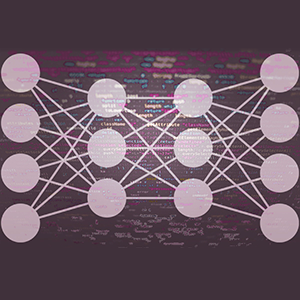 Generative pre-trained transformer 3, or GPT-3, is the third generation of the autoregressive language model developed by US-based company OpenAI and released in May 2020. The model was trained on about 45 TB of text data from webpages, books, and Wikipedia. GPT-3 showed better than state-of-the-art performance in language modeling evaluations and performed well in such natural language processing (NLP) tasks as translation and question answering. Apart from language processing and generation, the model is also capable of coding in such programming languages as Python, CSS, and JSX.
Generative pre-trained transformer 3, or GPT-3, is the third generation of the autoregressive language model developed by US-based company OpenAI and released in May 2020. The model was trained on about 45 TB of text data from webpages, books, and Wikipedia. GPT-3 showed better than state-of-the-art performance in language modeling evaluations and performed well in such natural language processing (NLP) tasks as translation and question answering. Apart from language processing and generation, the model is also capable of coding in such programming languages as Python, CSS, and JSX.
Semiring – NLP Technologies
The US-based startup Semiring provides businesses with semantic NLP analytics, knowledge extraction, as well as AI and NLP modeling. The startup’s algorithms extract information from structured and unstructured textual data, audio, and images to create knowledge graphs. Semiring’s custom models and software improve the efficiency of business processes in companies across numerous industries.
Are you looking for a breakthrough?
Despite the unprecedented restrictions due to the coronavirus pandemic and the economic downturn as a result of it, tech startups and companies made some breakthroughs. Many new startups were also founded across industries – check our startups to watch out for 2021 in healthcare, energy, logistics, and pharma.
Will your business benefit from investing in cloud-native technologies, quantum computing, or AI? Let us find the right solutions for you. We provide you data-driven insights into new startups, scaleups, and emerging technologies to help you stay competitive.
